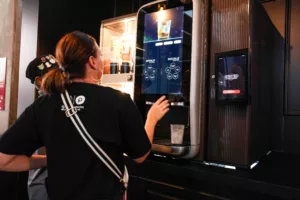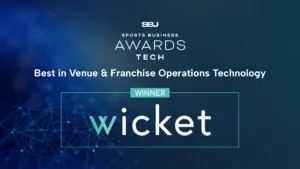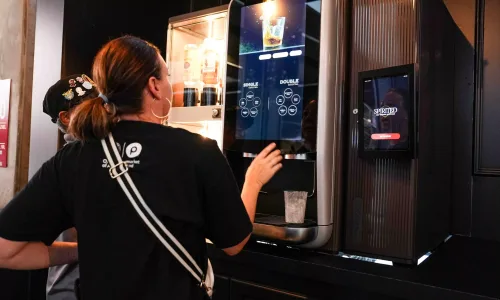KEY TAKEAWAYS
- Would-be users have understandable reservations about biometric technology
- Wicket, a provider of facial authentication, maintains an express commitment to protecting user privacy and biometric data
- Operating on a model of consent, transparency, and advocacy for regulatory oversight, Wicket safeguards its users’ information
Today we stand at a technological precipice. Artificial intelligence, virtual reality, and biometric technology are just a few of the developments that coax us toward a gleaming, futuristic reality. Facial authentication is one such promising innovation, but with new advancements come new conversations. Many harbor understandable reservations about the safety and usage of their biometric data. While these concerns may be well-founded, they diminish when users work with the right company—one that protects and esteems their privacy.
As a leader in facial authentication, Wicket has built its entire platform around the principles of privacy protection and user empowerment. Here, we’ll explore the unique measures we’ve taken to safeguard end-user privacy and the perspective that drives that commitment. We’ll explain our approach to consent, data handling, algorithmic fairness, and regulatory advocacy.
What Does Wicket Offer?
In many ways, Wicket sells a form of convenience that translates to an exceptional and seamless experience for sports fans, conference attendees, and a host of other live event participants. By using a selfie to create a biometric token, a participant’s face can be used to recall ticket information, preferred payment methods, and many other useful data points in a fraction of the time it takes to manage these transactions traditionally.
Facial authentication technology is also extremely reliable and secure (Wicket boasts 99.7% accuracy and has a 0.0% reported false positive rate), and it can be incredibly financially beneficial for operators. But the best part is, it’s a lot of fun and easy for everyone to use. However, delivering these unique benefits requires handling sensitive user information that, if compromised or misused, could lead to very severe consequences.
Trust is earned, and that’s why it’s a core business value to protect user data with state-of-the-art data security architecture that ensures their information is utilized only in the ways they intend and to which they consent. Additionally, being an ethical tech company means looking out for people in all the ways they take for granted as well as critical areas they may not entirely understand. It’s the foundation of everything we do, and the following are some of the most important areas we focus on.
1. A Commitment to Opt-In/Opt-Out and Consent
At the heart of Wicket’s approach is a strict opt-in policy. Users must actively choose to participate in the facial authentication system by submitting a selfie photo, which is then transformed into a unique facial template, essentially a mathematical representation of the submitted image. Additionally, users who opt-in can be confident that Wicket is using the data they choose to submit in a way that is narrowly confined to the purpose for which they explicitly consent—and no other.
This opt-in/opt-out model grants users complete control over their participation. They can withdraw their consent at any time, resulting in the immediate deletion of all their data from Wicket’s system. This level of transparency and control helps foster trust between users and the technology.
2. Purpose Driven—Not Surveillance
Wicket uses the term “facial authentication” over “facial recognition” to highlight its consent-first approach. While traditional facial recognition systems often operate on a surveillance model—covertly matching faces against extensive databases—Wicket’s technology focuses solely on authenticating known users who have opted into the system for specific use cases.
This distinction is crucial: Wicket’s system doesn’t scan crowds indiscriminately. Rather, it recalls linked ticketing, access, and payment information for individuals who have explicitly chosen to participate only when they engage with the system at designated transaction points.
3. Prioritizing Data Privacy and Security
Wicket takes data privacy seriously by using robust security measures throughout all of its operations, from data storage to communication between edge devices that minimizes the risk of data interception.
Furthermore, all data is encrypted to industry-standard levels at rest and in transit. So by ensuring that sensitive information is protected at every stage, Wicket reinforces its commitment to safeguarding user privacy.
4. Fighting Algorithmic Bias
Wicket is committed to fighting algorithmic bias and making sure our technology works fairly for everyone no matter their race or gender. We craft our facial authentication algorithms in-house and work hard to ensure they’re accurate for all types of users. To prove this, we’ve had our technology tested by a respected government agency called NIST. The test showed that Wicket’s system is 99.7% accurate for people from all backgrounds. This means Wicket’s technology is not only reliable, but it aims to treat everyone fairly.
5. Robust Infrastructure and Application Security
Wicket uses top-notch security for its computer systems and applications. We utilize Amazon Web Services (AWS) and their industry-leading secure digital storage and computing power.
But Wicket doesn’t stop there. We also have systems in place to regularly test our applications and infrastructure to identify potential security vulnerabilities and are diligent about keeping up with ever-changing best practices.
In doing all this, Wicket creates a strong digital fortress to keep user biometric data safe from anyone who shouldn’t have it. That’s why we’re continually working to stay one step ahead of potential threats.
6. Advocating for Regulatory Oversight
In addition to internal commitments to end-user privacy, Wicket actively supports government oversight of facial authentication technologies. We believe that clear regulations are essential for protecting user privacy and maintaining public trust in biometric systems.
By advocating for strong regulatory frameworks, Wicket aims to ensure that all stakeholders—technology providers, customers, and end-users—adhere to strict privacy standards.
Putting Privacy at the Center of Tech
Wicket’s approach to facial authentication provides a compelling model for how biometric technologies can be implemented responsibly and respect individual privacy rights.
Ultimately, Wicket’s efforts reflect a growing recognition within the tech industry: long-term success hinges not only on technological capability but also on earning and maintaining user trust. By fighting for end-user privacy, Wicket isn’t just protecting individuals; we’re normalizing a future where biometric technology is only used ethically and effectively.







